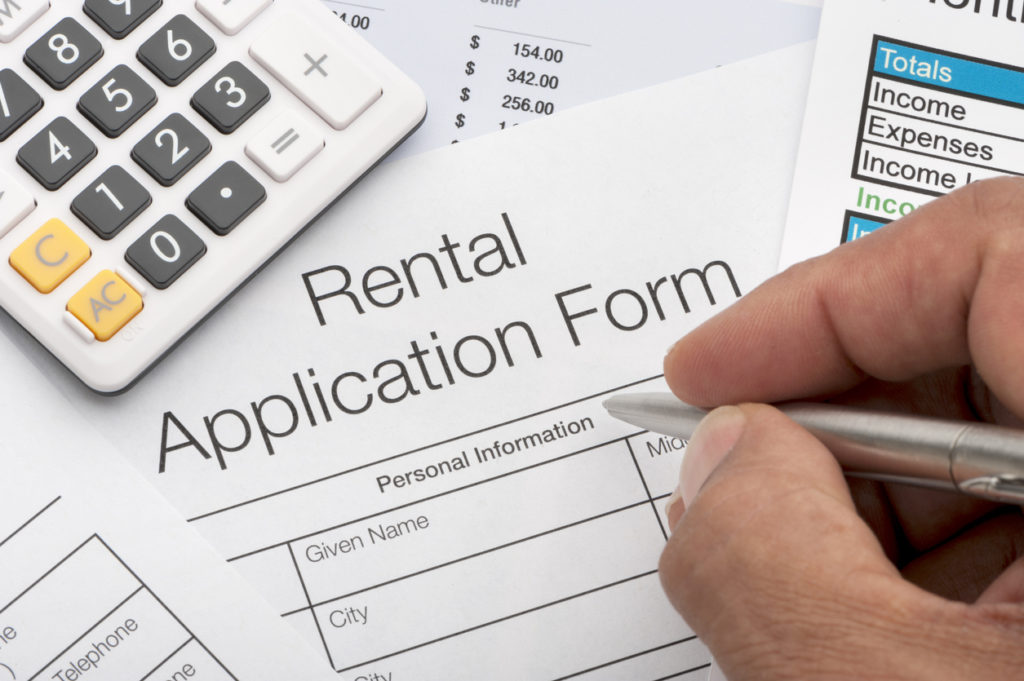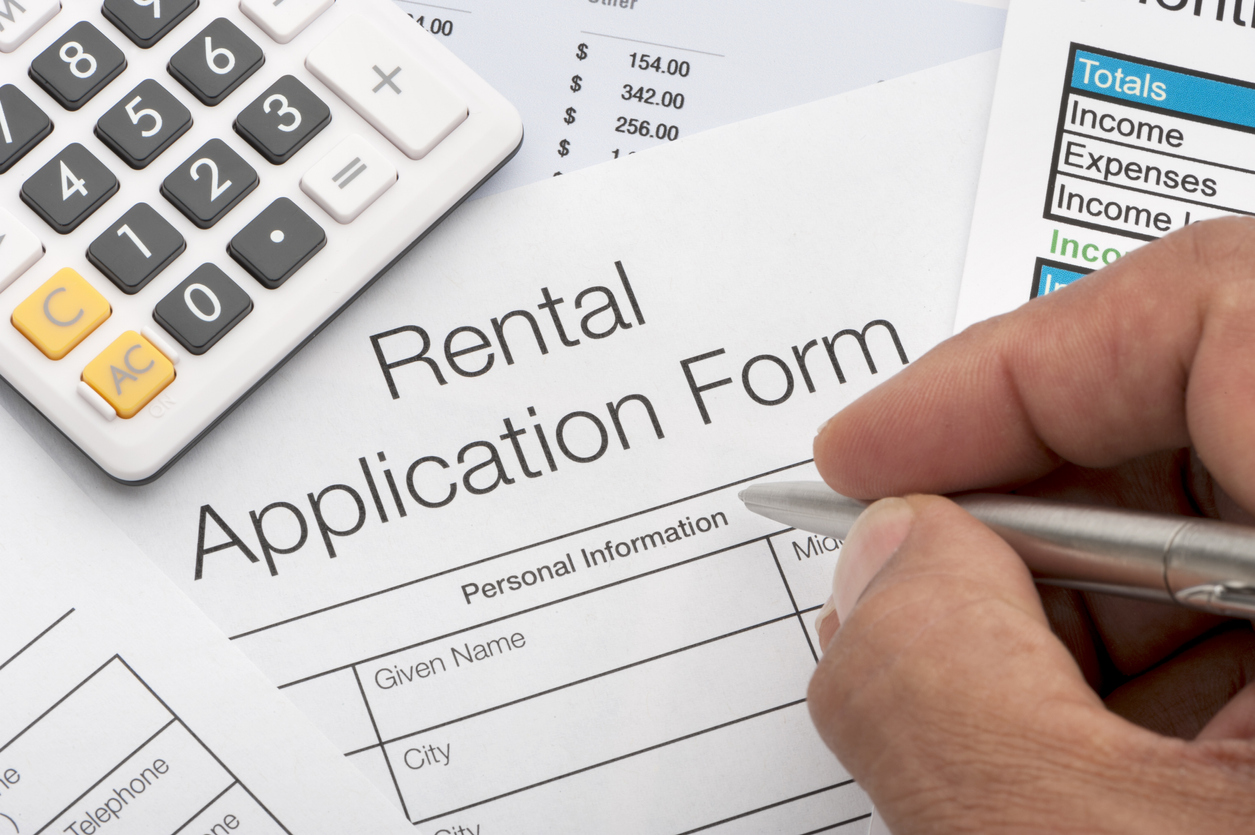Use this Free Rental Application Form, follow my tenant screening advice, and you’ll be on your way.
Are you a landlord gearing up to rent out your property? The key to success lies in your Rental Application Form Template. In this comprehensive guide, I’ll walk you through the process of obtaining and utilizing a Free Rental Application Form effectively. Let’s dive in!
Table of Contents (clickable)
- How to Download the Free Rental Application
- Step by Step Instructions on Preparing the Application
- Explanation of each Section and how the Tenant should Fill it Out
- 11 Frequently Asked Questions (FAQ’s) about Rental Applications
- Credit Reports and Criminal Background Checks
- Rental Applications Fees and Laws for All 50 States
Download the Free Rental Application Template
Choose your preferred file format for the Rental Application. If you’re comfortable with PDF and Adobe Reader, click the PDF icon to fill out and print the form. Opt for time efficiency with eForms by clicking here for a guided form creation process. For Microsoft Word users, download the online Rental Application Form in WORD by clicking the respective icon. Click on the file format images below to access the form, and remember to right-click and select “Save As” to save it.
Quick Steps to Prepare Your Application

Does this scenario sound familiar? A prospective tenant (also referred to as an “applicant”) has contacted you about renting your property. After conducting initial phone inquiries and showing them the property, they have requested an application.
What Property Is This Application For?
If you have multiple properties (which I hope you do, or I hope you will), this line is good for identifying which property the tenant wants to apply for. You don’t want to hand out a blank rental application and then get it back not knowing what property it is for. So you can type the address of your property into this section, or simply fill it out by hand right before you give it to the prospective tenant. Here’s how to customize the free rental application form:
Fill out the Landlord’s Name
Who is the “Landlord”? Is it you personally? Or is it your Company or LLC? Put that in the space in the first paragraph. This will let the prospective tenant know who they are dealing with.
Landlord Contact Information
Your applicant might be looking at lots of properties and collecting applicants from all of them. Therefore, you want to identify your application with your name and contact information. You’ve already put in your name, but go ahead and fill out this “block” with your:
- Name (landlord name)
- Address
- Phone
- Fax (if you still have a fax)
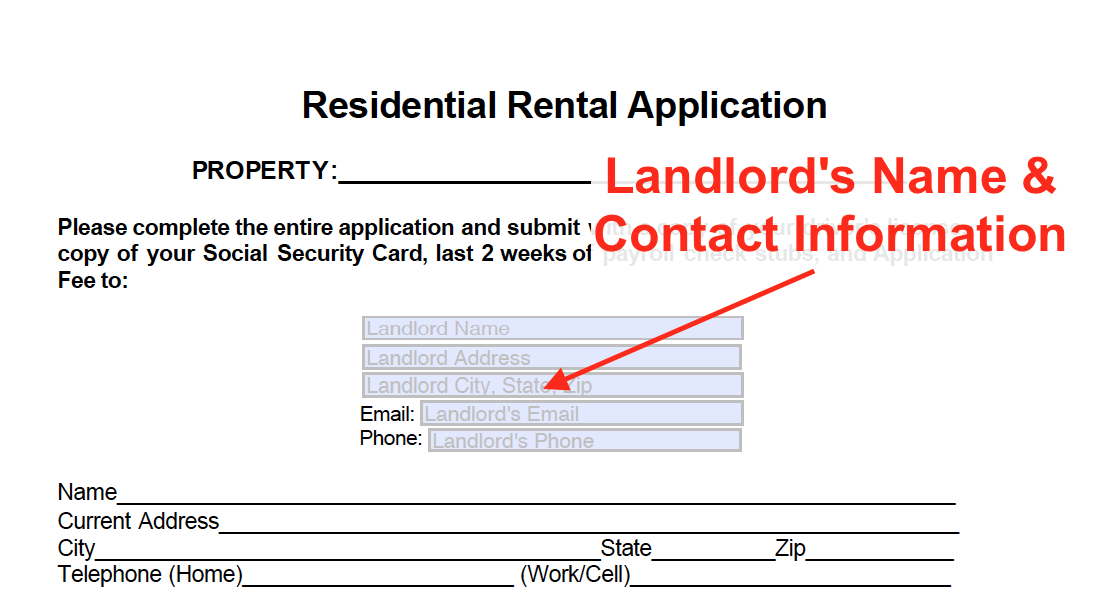
And guess what? That’s about all you have to do on this Rental Application Form. The rest is up to the prospective tenant. But you do need to understand why you are asking the questions there, so you can make a YES or NO decision about the applicant.
To help you, below I will go over each part of the application that they must fill out, and I will explain to you why you want to ask those questions.
Understanding and Filling Out Your Rental Application Sections

Below I will explain each section that the applicant must fill out and the reason why we want that information. But I would also like to say this: Tell the applicant that you DO NOT accept incomplete applications. Why? We don’t want them leaving out key information. Enforcing that little rule may also scare off the bad apples, and that’s a good thing. So tell them they must fill it out completely.
Applicant Basics:
Let’s start with the basics. We need to identify who’s eyeing the property—essential info like Name, Current Address, and Contact Details. Critical data such as Social Security and Driver’s License numbers is a must for credit reports and background checks.
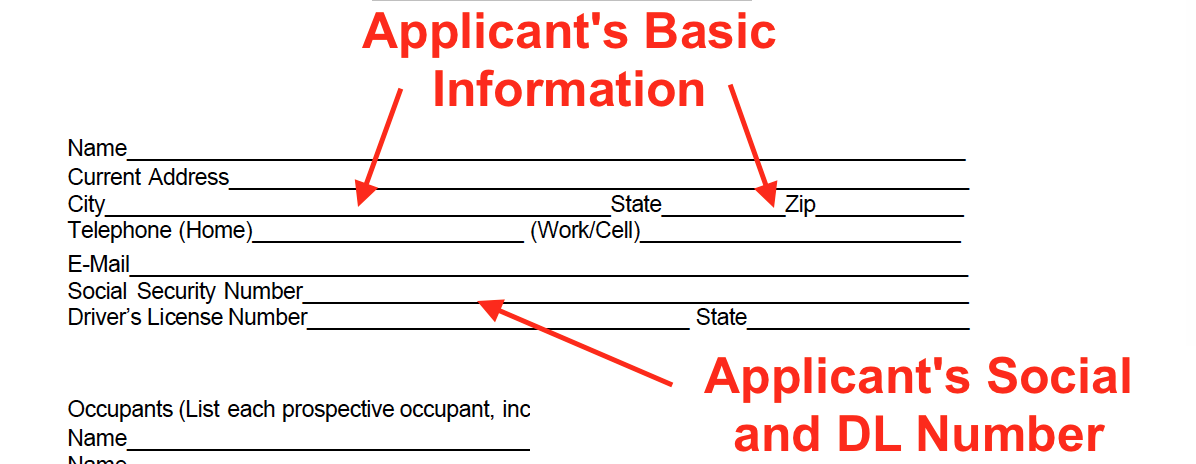
List of Occupants:
Identifying potential residents is crucial. All adults, whether financially responsible or not, must submit an application to preemptively address any potential concerns.

Pets:
We’re curious about furry friends to ensure they align with property rules. While discriminating against standard pets is acceptable, there are exceptions under the Americans with Disabilities Act (ADA) for service or emotional support animals, then the landlord may NOT discriminate against the applicant even if there is a “No Pets” policy in place.

Current and Previous Landlords:
Reaching out to current landlords gives us current insights, but cross-checking with previous landlords provides a more comprehensive understanding. Any discrepancies or notably low current rent can raise red flags.
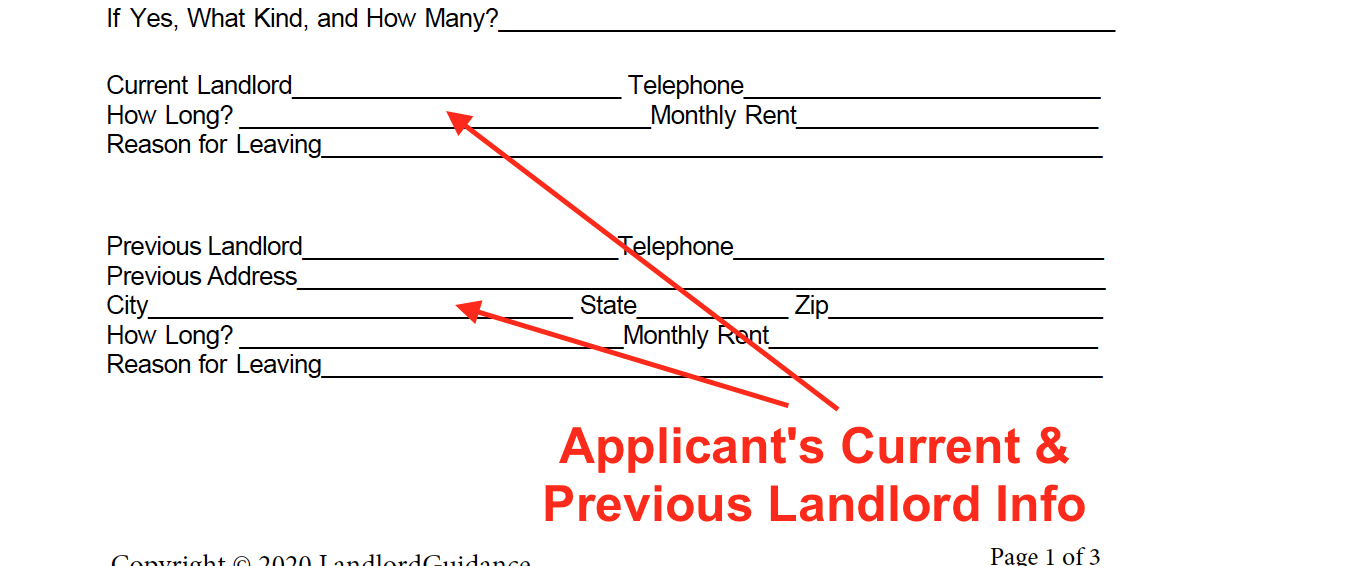
Current and Previous Employers
There is a saying, “Past performance is an indicator of future success.” It may not be totally true, but on the other hand, we are not fortune tellers. We look at their past income and current income to see if they make enough (3X the rent) to afford the rent. In this section, the applicant should complete:
- Employer Name
- Employer Phone
- Applicant’s Position and Length of Employment
- Applicant’s Gross Income
- Applicant’s Take Home Pay
They should give you all this info for all employers going back 3 years.
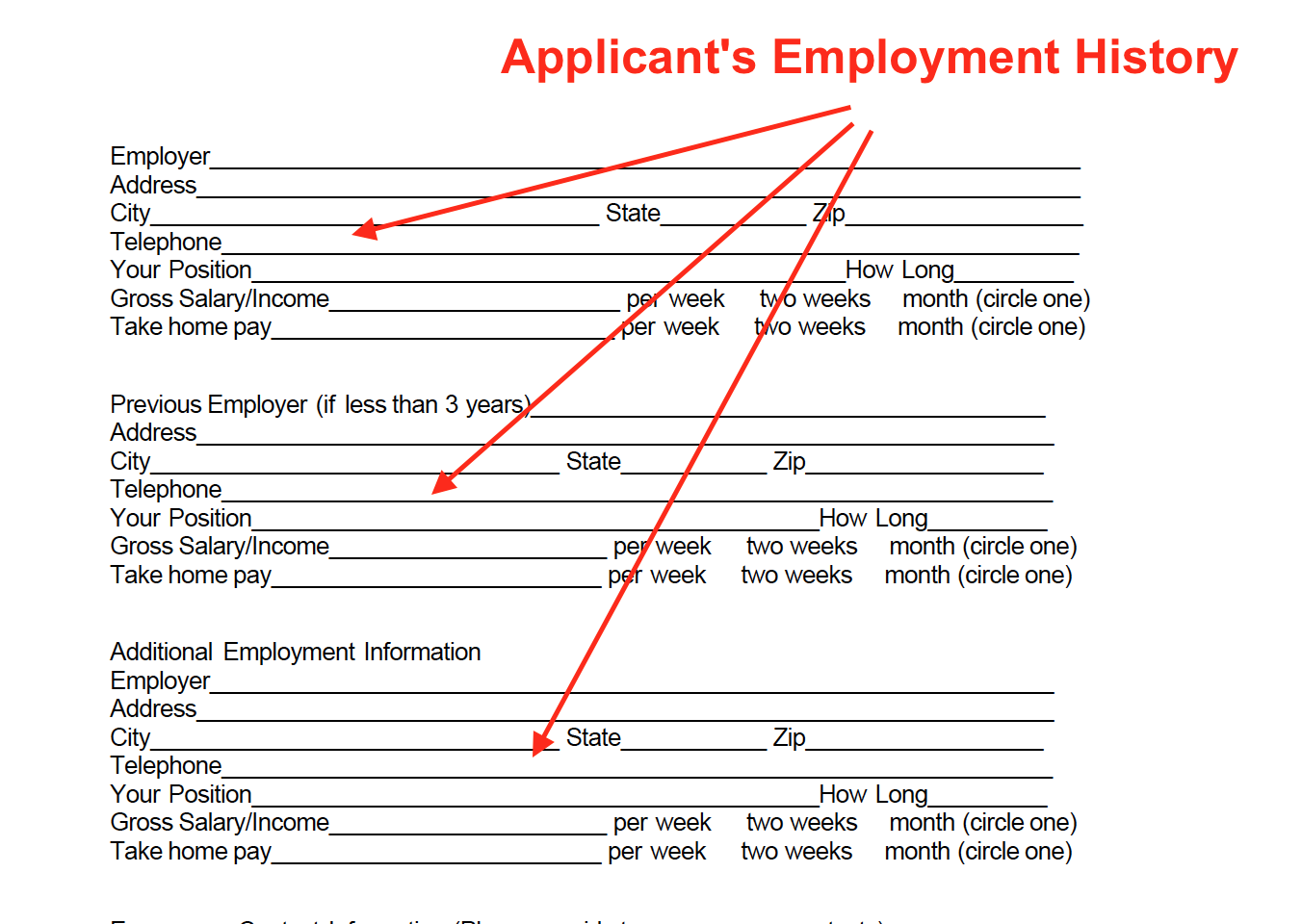
Emergency Contact Information:
Though rarely utilized, emergency contacts are pivotal for unforeseen situations or potential lease abandonment. Two contacts, detailing Name, Relationship, Address, and Phone Number, should be submitted.
So make sure the applicant gives you 2 emergency contacts including:
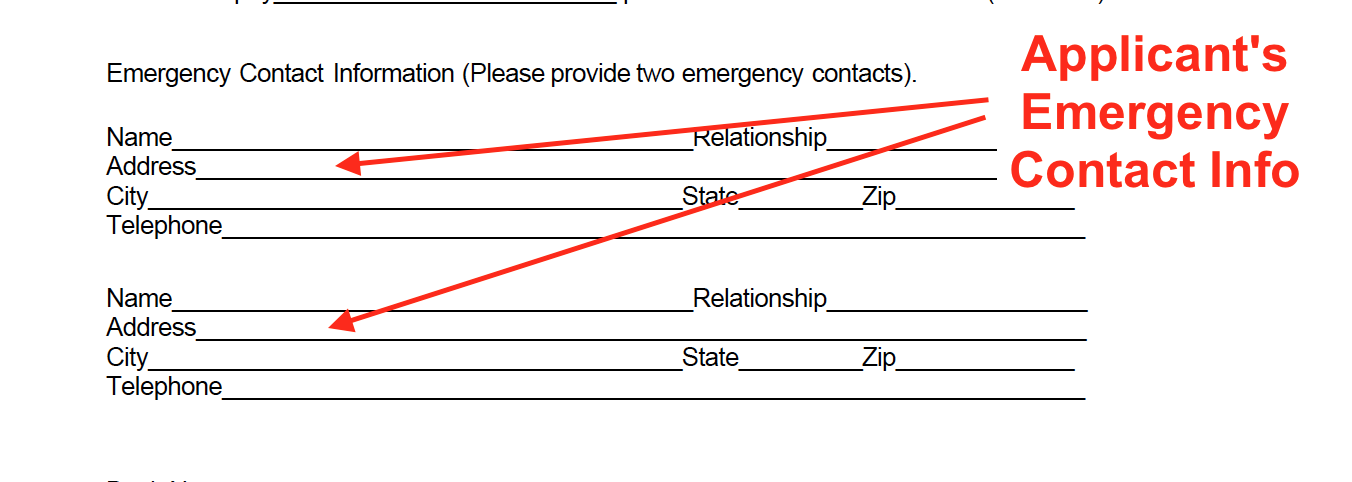
Bank and Other Income:
Bank particulars and additional income sources are requested to filter applicants and establish a starting point for potential future collections in case of legal proceedings.
1. It will scare away applicants that do not have bank accounts. Unless you are dealing in low income housing, this is a good thing. If someone is not using a bank, they may have garnishments against them.
2. If you ever have to sue the tenant and collect on a judgment against them, at least you will have a starting point when looking for their assets. Yes, they can easily switch banks, but you’ll look here first.
So make sure the applicant fills out:

Vehicles to be Parked on Property:
Documenting vehicle specifics aids in monitoring who’s on the property and helps weed out excessive vehicle storage, ensuring a seamless tenancy.
If the applicant needs 4 more rows on this section because they have 6 inoperable cars, RED FLAG. You don’t want a tenant with a ton of vehicles stored on your property. So this section screens that out.
Therefore, the applicant should give you the following for each vehicle:

Rental History and Criminal History Questions
Honesty is the bedrock here. Questions about eviction, lease breaches, and felonies are posed, with a keen eye on the applicant’s forthrightness.
Have the applicant answer these 3 questions:
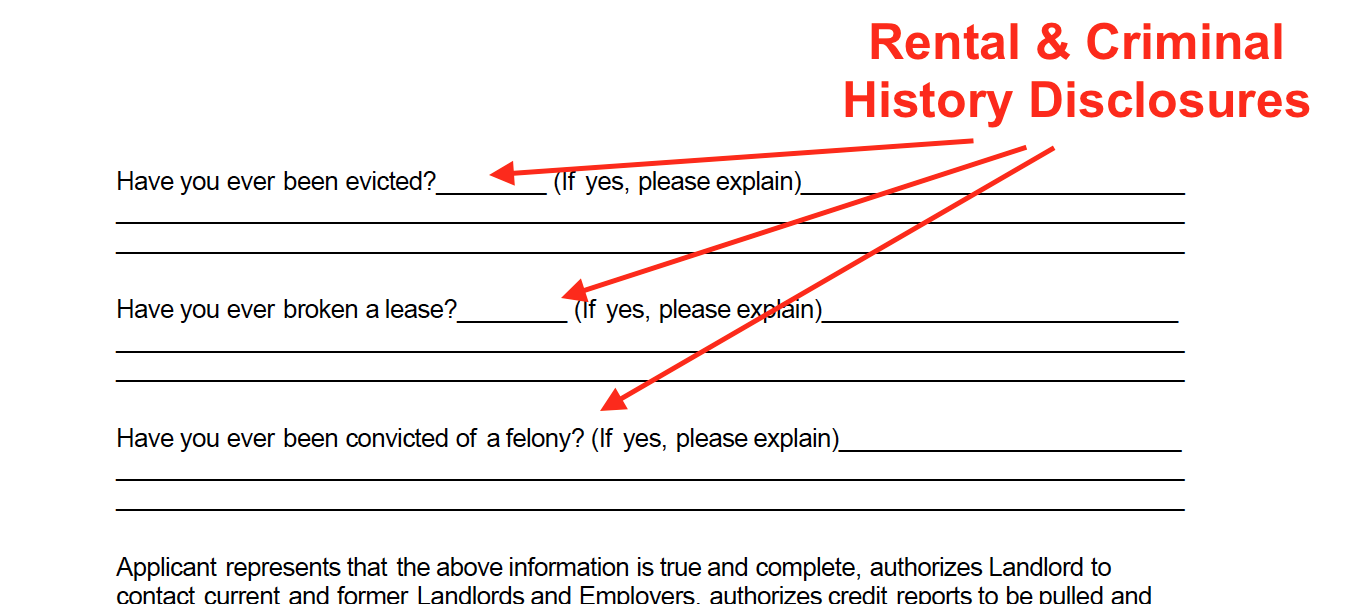
Sign Your Life Away
As Ronald Regan said, “Trust, but Verify.” The applicant now needs to sign, and they are signing for two things:
1. They are verifying that all the information they gave you is truthful. If you find out they lied when you pull credit and criminal checks, then you will deny the application.
2. They are also giving you authorization to verify all the information they gave you. Specifically they are saying you can call their current and former landlords, call their current and former employers, pull their credit reports, and run criminal background checks.
Once the ink dries on the rental application form, the investigative journey commences. In our next segment, we’ll tackle common queries surrounding rental applications and effective tenant screening.

In the next section, I will go over some important common questions regarding Rental Applications and how to screen for good tenants.
11 Frequently Asked Questions (FAQ’s) about Residential Rental Applications

1. What do I ask on the phone when a person calls about my property?
- Ask for their name and phone number
- Ask why they are looking for a new place to live (if they are being evicted – bad sign!)
- Ask for when they need to move and how long a lease term they need (this tells you how serious they are)
- Ask about smoking and pets (this could be a deal breaker for you)
- Definitely tell them that you do a Credit Check and Criminal Background Check. This will scare away many bad tenants.
- If you feel like they will be bad tenants after speaking on the phone with them, do NOT waste your time showing them the property. It will only make it harder to say “NO” to them.
2. Does each prospective tenant need to fill out a separate application?
Yes. Why? The first reason is that you don’t want any bad tenants living there, even if they are not responsible for paying the rent. What if they have a history of destroying property? Or have a violent criminal history. You need to know this. Another reason is that you should be in the habit of treating everyone the same, or else you might get accused of being discriminatory. For example, if you make one applicant fill out an application and another person not, and the first one is in a protected class (race, disability, etc.), they might accuse you of discriminating against them in violation the Fair Housing Laws (see next question).
3. What can NOT be asked on a Rental Application?
The Fair Housing Act dictates that you cannot discriminate based on the following protected classes. RentPrep offers a good overview here.
What that means in terms of the Rental Application is that you better not ask the applicant the following:
- What is your Race?
- What is your Color?
- What is your Religion?
- What is your National Origin/Ethnic Background?
- What is your Gender?
- What is your Familial Status?
- Do you have a Mental/Physical Disability?
Also, do not ask about sexual identity. Many laws are being passed that protect the LGBTQ Community as a class, and I wouldn’t be surprised if in a few years the Fair Housing Act will be updated to protect them also.
4. How much do I charge for an Application Fee?
In general, charge whatever will cover the cost of the credit report and criminal background check. And you should always charge an application fee, unless you are in one of the few states that prohibit it (check chart below). By charging an application fee, you will dissuade bad tenants from applying because they know they won’t meet your standards and don’t want to waste their money. If it’s free for them to apply, they will think, “why not roll the dice?”. Charging an application fee will also ward off those people who are not serious about renting, or who are just shopping around. If you don’t have a fee, they may apply “just to see if they would get accepted.” And that would waste your time.
5. What do you say to previous landlords?
I once called an applicant’s “previous landlord” and the person sounded really weird. He then admitted that he was just the applicant’s friend and he apologized profusely for lying, saying he doesn’t ever lie, but his friend, the applicant, begged him to help out.
The tenant screening company AVAIL recommends the following script when calling previous landlords:
“Hi, I’m calling in regards to Jane Doe. She is interested in renting an apartment from me and put your name down on the application. How do you know Jane?”
This is very clever. Do you see how it is vague? If the person is just a friend (like what happened to me), they will not know what role they are supposed to be playing and will stumble. But if it’s a real landlord, they will jump right in. You then should ask:
- When did they live there?
- Was rent paid on time?
- Did they take care of the property?
- Did they disrupt their neighbors at all?
- Is there anything else I should know about them?
6. How do you verify employment and income?
The short answer is that you call their employer. However before you call, Google the phone number they have provided you to make sure it is really their place of employment. You want to make sure they didn’t just give you the number of their buddy (who will lie for them).
You can also ask for their W-2 Form, which has their employer’s name and Tax ID Number on it. You also may ask if they have an offer of employment letter from their employer, although many people don’t have those.
7. What are things that you CAN Discriminate Against a Rental Applicant For?
The word “discriminate” sounds pretty bad. But the way we screen applicants is by holding certain facts against them. But these are not things out of their control like race, etc. We are holding other things against them that they can control. Here is a list of things you can (and sometimes should) discriminate against an applicant for:
- Bad Rental History (evictions, etc.)
- No Rental History
- Being a Smoker
- Having Pets, or Certain Kinds and Amounts of Pets
- Bad Credit
- Criminal History (but see new HUD Guidelines)
- Not Having Enough Income
- Lying on the Rental Application
- Turning in an Incomplete Application
- Getting a Bad Review from Employers, Landlords or other References
8. What documentation should the applicant provide along with their application?
Along with an application fee, which I explained above, the applicant should provide you with:
- Copy of Driver’s License
- Copy of Social Security Card
- Last Month of Pay Stubs
- Some Landlord’s ask for their W-2 Form
9. How many applications should you collect before picking an applicant?
I like to have at least 3. Sometimes the first one you get looks great, until you see a couple more. But if you get a really good one, and no more come in, then go with it. If you get 5 bad rental applications, don’t settle for one of them. Hold out until you get a good one. It’s better to let your place sit empty for a few weeks while you source the right tenant, than to put in a bad one only to be doing an eviction a couple months later.
10. What are some Red Flags to look out for during the rental application process?
Incomplete Rental Application. If they don’t care enough to properly complete the application, then they won’t care about paying rent on time or taking care of your property.
Criticizing the Property while they are looking at it. If they are already complaining about the place, then just wait until they sign an lease and move in. The complaints will be non-stop. You don’t want that. I made that mistake before and I really regretted it. Just move on to the next applicant.
Applicant looks disheveled and unkempt. When you see the applicant in person, do they look clean and neat, or disheveled and unkempt? Does the inside of their car look like a dumpster on wheels? Unkempt people may have a problem keeping their home clean and avoiding health and safety problems.
Unstable Employment. If they are in and out of work, it will be hard for them to pay the rent consistently and on time. Unemployment is currently at all time lows. There is no reason for you to rent out your long-term investment to somebody who does not have consistent income. Next!
Showing up to look at the property with 10 extra people. I once showed my rental house to what I thought was a family of four. They showed up with 14 people. Cousins, aunts, uncles, nephews…, who knows. And the kids were running around being very loud and destructive. In hindsight I should have just kicked them out, but I was too nice back then. The point is, I was 100% sure that if I rented to these people, pretty much all of them would be living there, or at lease spending a lot of time there, damaging the place.
Applicant is in an insane hurry to sign a lease. There is a saying that “anything that starts quickly will end quickly.” When someone is so quick to sign, they might be getting evicted from somewhere else, or running from something dangerous. Try to figure out what the reason is.
Flakiness. They cannot make up their mind about turning in the application or signing the lease. If they are back and forth, wasting your time with endless questions, they might “change their mind” after signing the lease and move out. Don’t go with these people.
Being difficult to work with, and/or criticizing their current landlord. Your tenant will be someone you have to work with and collect money from every month. Do you want that person to be a total jerk that has a history of trashing their landlord. No way. Move on from this kind of applicant.
If the applicant wants to “make payments” on the Security Deposit. This means that the applicant has almost zero savings, and cannot pay the Security Deposit up front. It is a sign that they will be paying the rent late every month in the future.
“Bad” Criminal History. I once accepted an applicant who had a criminal history of possession of marijuana and resisting arrest (stemming from the same incident). I know that the “resisting arrest” part could have just been him arguing with the officer. He was a great tenant for 10 years, and I’m so glad I accepted him. But other more serious crimes such a sex crimes, violent crimes, and drug dealing are the ones to look out for.
11. What do you say to an applicant to deny their application?
Do it quickly, gently and nicely. The reason to do it quickly is so that they can move on and go apply at another place. You do it gently and nicely to reduce any anger that could lead to a discrimination claim. And a note on discrimination:
ALL applicants must be treated equally under the Fair Housing Act. You must not pick a tenant using any information about their race, religion, etc. (See Protected Classes in Number 3 above).
I you have a few good applications, make an offer to the best one, and tell them they must get back to you in 24 hours because there are other applicants. After they say “Yes,” you can tell the other applicants, “I’m sorry but we accepted another applicant.”
If you get one application and it needs to be rejected (because it’s bad), just tell them, “I’m sorry but we have to reject your application.” If they ask why, you can tell them the reason (income, credit, etc.).
And beware, they might get mad. I had a lady yell at me saying I had no right to tell her that she couldn’t rent my house. I just said, “I’m sorry but you don’t make 3 times the rent. That’s our policy.”
Credit Reports and Criminal Background Checks as Part of the Rental Application
Is Pulling a Credit Report Really Necessary?
Yes. Because an application can shine like gold until you see their credit.
From their credit report, you will be able to see:
- Do they pay their debts on time?
- Are they burdened with too much debt?
- Do they have eviction judgments against them?
- Have they filed for bankruptcy?
- Are there many collection agencies after them?
- Does their rental history on their credit match what is on their rental application?
Keep in mind that not all of these should stop you from renting to an otherwise good applicant. I used to be a bankruptcy lawyer, and most of my bankruptcy clients still paid their rent on time. Why? Because they had income to pay it, and they needed a roof over their heads!
Even lots of credit card debt doesn’t scare me that much as a landlord, because tenants usually know that they must pay their rent first, before they pay their credit card bills.
What does in fact scare me on the credit report are evictions, judgments, etc. This indicates a bad history with landlords and renting, and I don’t want to be the next stain on their credit report.
Why Hassle with a Criminal Background Check?
Because you need to know who you’re dealing with.
- You don’t want to be handing an eviction notice in person to a guy who assaulted his last 3 landlords.
- You don’t want any liability risks from renting to drug dealers, violent people, or sex offenders.
- And depending on the type of crime, there is an increased risk of damage to your property, not getting rent, alienating the neighbors, etc.
Therefore, be a smart landlord and run a credit report and criminal background check on every single applicant. You can cover the cost by charging an application fee, and you will get valuable information that will help you make your “Accept or Reject” decision.
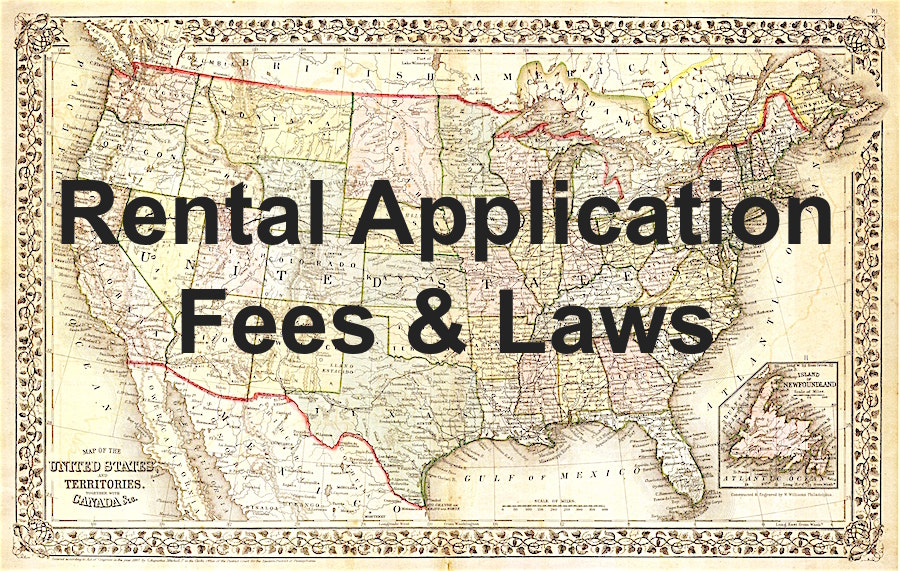
Rental Application Fees and Laws for All 50 States – Reference Chart
This table shows the Rental Application Fee Limits (if any) and the Federal and U.S. State Laws (if any) that apply to Residential Rental Applications, Application Fees, and the process of Landlords screening rental applicants.| State | Application Fee | Notes | Rental Application Law |
|---|---|---|---|
| Federal Government | N/A | Your rental application process must treat all applicants equally and must not discriminate based on race, color, national origin, religion, sex, familial status, or disability. | Fair Housing Act |
| Alaska | Landlord may charge an application fee to place applicant on a waiting list. | If the application fee covers the landlord’s actual, reasonable costs for tenant screening, it is probably lawful. | Alaska Landlord Tenant Act |
| Arizona | No Limit on Application Fee | ||
| Arkansas | No Limit on Application Fee | Application Fees do not have to be refunded | |
| California | $50.94 is the Current Maximum Application Fee a Landlord may Charge | The Maximum Fee increases over time because it is tied to the Consumer Price Index | California Civil Code §1950.6 |
| Colorado | The entire amount of the application fee must be used to cover the landlord’s costs in processing the rental application. | Bill passed April 2019 | Colorado House Bill 19-1106 |
| Connecticut | No Limit on Application Fee | ||
| Delaware | Fee should not exceed the greater of either 10 percent of the monthly rent for the rental unit or $50 | Delaware Residential Landlord-Tenant Code | |
| Florida | No Limit on Application Fee | Guidelines state that fee should only be what is necessary to cover screening costs, no more. | Florida Housing Corporation Guidelines |
| Georgia | No Limit on Application Fee | Application Fees do not have to be refunded | |
| Hawaii | No Limit on Application Fee | Application Fees do not have to be refunded | |
| Idaho | No Limit on Application Fee | ||
| Illinois | No Limit on Application Fee | Application Fees do not have to be refunded | |
| Indiana | No Limit on Application Fee | Application Fees do not have to be refunded | |
| Iowa | No Limit on Application Fee | Application Fees do not have to be refunded | |
| Kansas | No Limit on Application Fee | Application Fees do not have to be refunded | |
| Kentucky | No Limit on Application Fee | Application Fees do not have to be refunded | |
| Louisiana | No Limit on Application Fee | Application Fees do not have to be refunded | |
| Maine | No Limit on Application Fee | Application Fees do not have to be refunded | |
| Maryland | $25 Maximum Application Fee | Rental Application must explain what Applicant’s obligations and rights are if an application fee is collected. Maryland Attorney General | Maryland Real Property Code § 8-208 |
| Massachusetts | It is unlawful to charge an Application Fee in Massachusetts | Landlords are subject to legal claims for violating this | Section 15B General Laws Massachusetts Article by Attorney – MA Application Fees Ban |
| Michigan | No Limit on Application Fee | Application Fees do not have to be refunded | |
| Minnesota | Limited to the actual cost to screen the applicant | Landlords are also required to return any amount to the prospective tenant that is not used for screenings or references. Landlords may not accept application fees when no units are available. | Minnesota Attorney GeneralMinnesota Statute 504B.173 – APPLICANT SCREENING FEE |
| Mississippi | No Limit on Application Fee | Application Fees do not have to be refunded | |
| Missouri | No Limit on Application Fee | Application Fees do not have to be refunded | |
| Montana | No Limit on Application Fee | Application Fees do not have to be refunded | |
| Nebraska | No Limit on Application Fee | Application Fees do not have to be refunded | |
| Nevada | No Limit on Application Fee | Application Fees do not have to be refunded | |
| New Hampshire | No Limit on Application Fee | Application Fees do not have to be refunded | |
| New Jersey | No Limit on Application Fee | Application Fees do not have to be refunded | |
| New Mexico | No Limit on Application Fee | Application Fees do not have to be refunded | |
| New York | No Limit on Application Fee | Application Fees do not have to be refunded | |
| North Carolina | No Limit on Application Fee | Application Fees do not have to be refunded | |
| North Dakota | No Limit on Application Fee | Application Fees do not have to be refunded | |
| Ohio | No Limit on Application Fee | Application Fees do not have to be refunded | |
| Oklahoma | No Limit on Application Fee | Application Fees do not have to be refunded | |
| Oregon | No Limit on Application Fee | Application Fees do not have to be refunded | |
| Pennsylvania | No Limit on Application Fee | Application Fees do not have to be refunded | |
| Rhode Island | No Limit on Application Fee | Application Fees do not have to be refunded | |
| South Carolina | No Limit on Application Fee | Application Fees do not have to be refunded | |
| South Dakota | No Limit on Application Fee | Application Fees do not have to be refunded | |
| Tennessee | No Limit on Application Fee | Application Fees do not have to be refunded | |
| Texas | No Limit on Application Fee | Application Fees do not have to be refunded | |
| Utah | No Limit on Application Fee | Application Fees do not have to be refunded | |
| Vermont | Residential Rental Application Fees are Prohibited | Vermont Statutes § 4456a. Residential rental application fees; prohibited | |
| Virginia | Limited to $50 plus actual screening costs. For Public/HUD Housing, $32 plus actual screening costs. | Previous Virginia Law on Application Fees Repealed on October 1, 2019 | Virginia Residential Landlord Tenant Act |
| Washington | Application Fee must match the actual costs of the background check, and Landlord must show receipt to applicant. | Washington State has a list of procedures that must be followed during the application process. | Revised Code of Washington, Section 59.18.257 |
| West Virginia | No Limit on Application Fee | Application Fees do not have to be refunded | |
| Wisconsin | Landlord may only charge the cost to obtain a credit report, up to $20 (so $20 Maximum). | Credit Report must be from a national consumer reporting agency. The landlord must notify the tenant of this charge before requesting the report, give the tenant a copy of the report, and allow the tenant to provide their own report if it is less than 30 days old. | Wisconsin Landlord Tenant Guide |
| Wyoming | No Limit on Application Fee | Application Fees do not have to be refunded |
Conclusion – Using a Rental Application to Property Screen Tenants will Result in More Income for the Landlord

In this article, we’ve gone over how to download your Free Rental Application Form, how to customize it, how the applicant should fill out each section, the reasons behind each question, some FAQ’s about Rental Applications, and why you need to pull credit reports and run criminal background checks.
Let’s recap the main points:
- Always use a Rental Application
- Charge an Application Fee (check chart above)
- Always pull a Credit Report
- Always run a Criminal Background Check
- Treat Every Applicant Equally in the application process, in accordance with the Fair Housing Act
Now that you’re ready to use your Rental Application to get your next great tenant, I will leave you with one last piece of advice: Treat your tenants fairly and with dignity, and you will have much more success in the long run.
About the Author
Rich is an Entrepreneur, Landlord, and Lawyer licensed in Texas. He loves his family, working, and craft beer. He started Landlord Guidance in 2012 to help other landlords, and teach them that being fair and ethical with their tenants is the true path to success.
